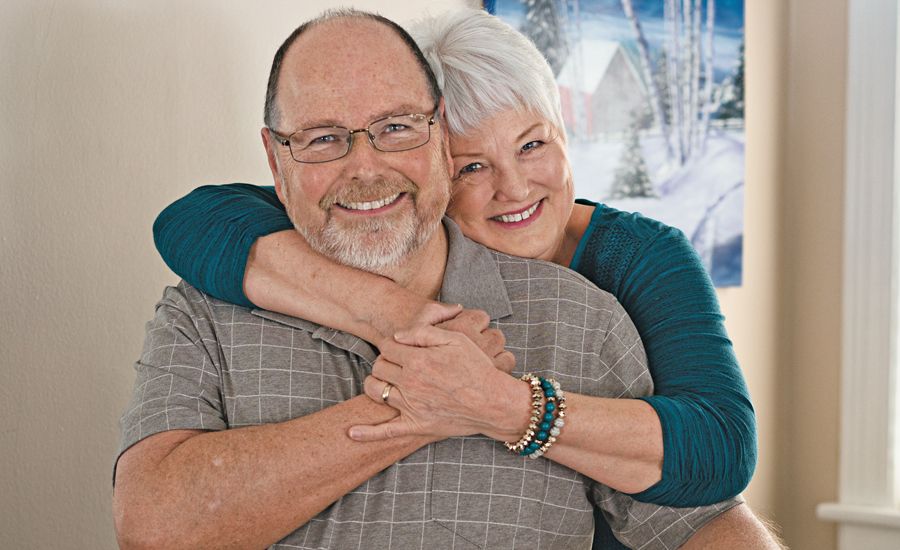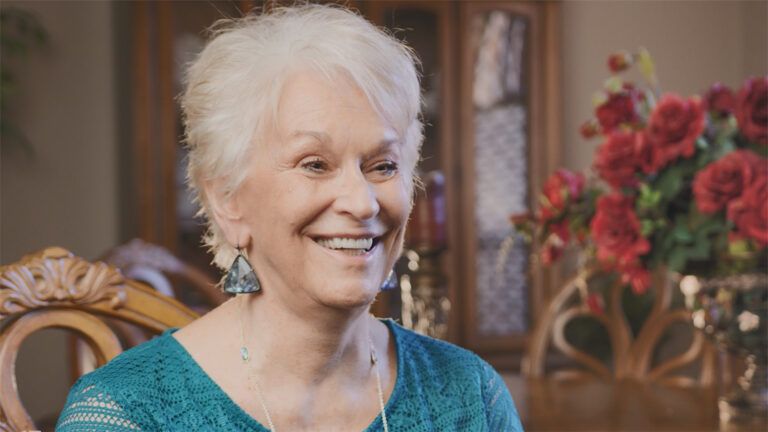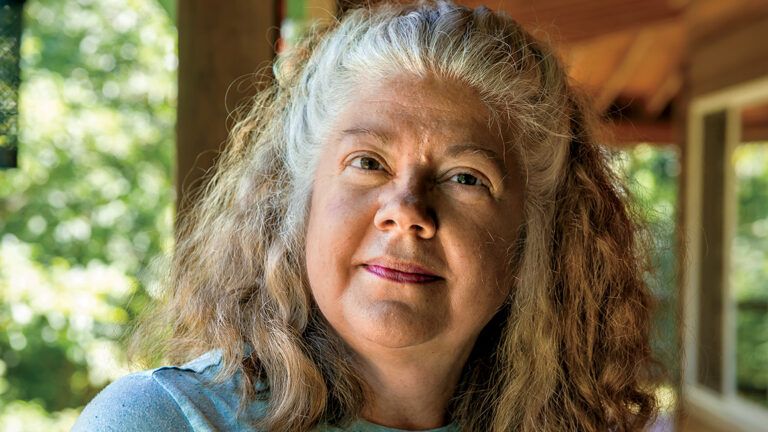Retirement. I wasn’t just looking forward to it. I yearned for it like a desert nomad glimpsing an oasis shimmering in the distance. After 40 years of marriage, of raising five daughters in the Detroit suburbs, of hard work—especially with my husband Joe’s demanding job in management at General Motors—this was finally going to be our time. To really be with each other. To reconnect. To fall in love all over again.
Then one terrible moment derailed everything and dispelled my vision of retirement for the mirage it was.
Father’s Day, 2012. Joe was newly retired, and we were riding our bikes around the little town of Reed City, Michigan, where we’d just bought a second home to be closer to our daughter Susan and our “up north” grandchildren. Pedaling leisurely, admiring the quaint old houses, we felt like the carefree teenagers we’d been when we started courting.
FOR MORE INSPIRING STORIES, SUBSCRIBE TO GUIDEPOSTS!
I came down a steep hill and rounded a corner just as a woman was backing out of her driveway. She hit the brakes. I waved and went by. Joe was a little bit behind me. I was almost to the next corner when I heard a sickening crunch. A scream. I turned. Joe lay sprawled on the street.
I raced to him. Blood trickled from his ear; his eyes were rolled back in his head. “Babe, please don’t die,” I pleaded, stroking his cheek. “Stay with me. This is our time, remember?”
His injuries—three skull fractures and a brain bleed—were too severe for the local hospital to treat him. An ambulance rushed him to a trauma center in Grand Rapids, an hour away. Susan and I followed in her car.
The ER chief met us. Joe lay unconscious on a gurney, hooked up to an IV drip of pain meds. “He coded when he got here,” the doctor said. “But he’s stable now. There’s a lot of swelling. We’re admitting him to the neuro ICU. We’ll re-scan him in the morning.”
An orderly handed me a clear plastic bag with Joe’s clothing. I choked back a sob. They’d had to cut everything off him, even his favorite University of Michigan sneakers.
I stayed by his bedside all night. The CT scan in the morning showed no change. “That’s the best we can hope for right now,” the doctor told me.
A few hours later they moved Joe to the regular neuro floor. Another good sign, I thought. The nurse closed the blinds and turned off all the lights in his room. “Your husband’s brain is trying to reboot,” she said. “He needs as little sensory stimulation as possible.”
I silenced my cell phone and sat in the dark, listening for his every breath. Joe was a whiz with numbers and computers—a math major at Michigan, a data guy for the actuaries in GM’s finance division. Over the years, he’d moved up the ranks to senior manager. His mind was always working.
What if it never works right again? What if…? I stopped myself. No, I couldn’t go there.
READ MORE: 4 TIPS TO HELP CAREGIVERS OF TBI SURVIVORS
Forty-eight hours after the accident, Joe regained consciousness. A team of therapists evaluated him. One got him to stand and take a few steps. He moved stiffly, like a robot. The therapist tried to get him to focus on her. His gaze wandered.
She gently took his face in her hands and said, “Hi, Joe. Who’s this lovely lady next to you?”
He glanced around, his eyes finally falling on me. “Joe?” he said tentatively.
“This is your wife, Marilyn.”
“Okay,” Joe said.
Not a flicker of recognition. I leaned against the wall and took a deep breath, trying to keep it together.
That night, while Joe slept, I laid my head on his chest, hoping the steady beat of his heart would reassure me. It didn’t. I played an old voice mail from him I’d forgotten to delete. “Babe, pick up. Pick up. Okay. You’re not there. I’m stopping at Bangkok Express. Chicken gang gai, right? Love you!” Kissing sounds.
Will he ever be the same again? Lord, bring Joe back. I’ll do whatever you ask, whatever he needs.
Joe was transferred to a new, state-of-the-art traumatic brain injury unit close to our home in the Detroit suburbs. The chief neurologist asked me what Joe was like before the accident.
“He was the smartest man I knew,” I said. I told him how Joe had excelled at his job, writing computer programs. “That’s not all. He played guitar and wrote songs. He made me laugh.”
The doctor handed me a tissue. I hadn’t realized I was crying.
“Your husband may do all those things again one day, but it’s going to be a long, slow haul,” he said. “How slow?”
“Usually whatever skills a TBI patient is going to regain, he regains within eighteen months to three years. Initially, Joe will need your help with almost everything. You’ll play a big part in his recovery.” I could deal with all that. Anything to get back the man I loved.
Find Hope, Inspiration, and More in our Free eBooks
I was at the TBI unit every day from 7:00 a.m. to 8:00 p.m. Joe couldn’t remember how to use a phone, so I called for his meals and set up his bed tray. I read him simple passages and tested his recall. I asked his therapists—he had speech, physical and occupational therapy—lots of questions, trying to soak up as much knowledge as I could.
A month after the accident, Joe was released, with a walker, into my care. I threw myself into being his caregiver. I made a chart to keep track of his 20 prescriptions. I drove him to therapists, doctors, the pharmacy. Joe didn’t like it. He was used to being in the driver’s seat and he’d drum his hand on the passenger door to show his annoyance.
Otherwise we didn’t get out much. Loud noises—cars honking, a dog barking—made Joe anxious. He couldn’t sit through a movie. The few times I invited friends over, he got upset at not being able to follow the conversation.
While he napped during the day, I cooked, cleaned, dealt with our finances (which Joe had handled before) and made phone calls. The only people I talked to regularly were doctors’ assistants and health-insurance reps. I texted everyone else, even our daughters, or posted Facebook updates. Week by week, month by month,
Joe regained his skills. Speech. Simple math. Walking unaided. His therapists cheered him on. I was surprised to find I had mixed feelings. Not surprised, no. Shocked. I was grateful Joe was getting better. Definitely.
But the stronger he got, the harder it was to care for him. He wanted to take charge of his pills but I didn’t trust him not to miss a dose. He chafed at my reminding him to exercise but he wouldn’t do it on his own. He never used to be difficult. Now he’d snap at me over anything I did to help him.
Not that I let on that things were getting to me. His neurologist had told me personality changes were common with brain injuries. I couldn’t confront Joe. Before, he would’ve taken what I said in stride; now his eyes filled with tears if he thought I was mad at him.
I kept my Facebook posts and text messages simple and upbeat. I couldn’t exactly write, “Joe is so stubborn! Everything has to be his way. I’m sick of it.” Who wanted to hear how frustrated I was? How I collapsed in bed at night wishing this had all been a bad dream?
Eighteen months post-trauma, Joe was back to handling our finances, cutting the grass, riding his bike (with a helmet). Then he was cleared to drive again. His therapists and doctors marveled at his recovery. I worried that they weren’t being cautious enough.
I was afraid of his driving alone. Especially in Detroit traffic. We sold our house in the suburbs and moved permanently to Reed City. The small-town environment was healing for him. I could almost see the tension leaving him.
The tension between us? That worsened. Joe wanted to assert his independence. I questioned him closely to make sure he took his medication correctly. I fussed if he didn’t tell me where he was going and for how long. I had to know his whereabouts. What if he got confused, as he still did occasionally? What if, God forbid, there was another emergency?
Maybe it was because being his caregiver was so intense, but it didn’t feel much like we were husband and wife anymore. When I told Joe I loved him, he’d reply, “Okay.” He rarely took my hand or hugged me. I kept listening to that old voice mail, trying to recapture the Joe who had been so sweet and loving.
Replaying the voice mail one night, I came across several others I hadn’t deleted. Messages in which Joe apologized for forgetting to pick something up or having to miss some event. Something or someone at work was always more important than me, than our family.
Listening to those messages, I wanted to lay into him. I wanted to tell him how badly he’d hurt me, how alone I’d felt sometimes raising our daughters while he worked late or was away on business.
But I didn’t. Joe’s memory had taken a hit because of the TBI, and things I brought up he often didn’t remember. What good would dredging up the past do? It was the accident that ruined our retirement. So I buried my anger and resentment, just as I’d been doing all those years.
This time, though, my feelings wouldn’t stay buried. The next day I found myself blurting out some not-so-fond memories, like the weekend our long-awaited family camping trip became just the girls and me because—surprise, surprise—something came up at Joe’s work.
Try These Self-Help Books to Reach Your God-Given Purpose
I went nuts the afternoon Joe left to help a buddy move stuff and forgot to tell me where he was going. “Where have you been?” I screamed when he got home. “I was so worried!”
By the time we went downstate for his final follow-up with his neurologist, two years after the accident, Joe and I were barely talking. The whole four-hour drive there the car was quiet.
The neurologist’s waiting room was empty except for a young pregnant woman with a toddler. I didn’t feel like chatting, but she started telling me that her husband was seeing the neurologist because he’d been in a motorcycle accident. “It makes me sad that he won’t be able to be there for me with our new baby the way he was with our first,” she said.
She kept talking. I only half-listened, thinking back to my own pregnancies and deliveries. Joe was with me for every birth, feeding me ice chips, rubbing my back, breathing with me. I thought about how when I was 46 and the girls were grown, I’d wanted to fulfill my dream of going to college.
Even though my tuition put a strain on our budget, Joe supported me 100 percent. That’s why at my graduation I wrote in glitter glue on my mortarboard, “Thank you, Joe!” Anything the girls or I needed or wanted, he made it happen without a word of complaint. Which was also why he’d gotten so far in his career. He was the same with his bosses.
I guiltily remembered those Friday nights he came home exhausted from work yet was still willing to go out to dinner or a movie or the symphony with me.
Those moments that were truly just ours were rare, and I longed for more. So I’d pinned all my hopes on retirement. Our time. No wonder I was angry and resentful about the accident and its aftermath. I felt like my hopes had been shattered when in fact, it was my unrealistic expectations.
I looked at Joe, sitting quietly in the neurologist’s waiting room, and I knew what he needed, what God was asking. Love your husband. For the man he was. And the man he is.
The drive home was the opposite of the drive down. I thanked Joe for all the ways he’d been there for me, for our family. I reminisced about the happy times we’d had, even though I wasn’t sure he’d remember. “I was scared we wouldn’t have more time together,” I admitted. “That’s why I’ve been so upset.”
Joe reached over and squeezed my hand. “I love you, Marilyn.”
A few days later we went to an antiques mall. We each went off on our own for a while. When I caught up with Joe, he was flipping through some old records.
“Look what I found!” he said. “The first present I ever got you.”
He handed me a 45. I had forgotten. The Carpenters’ “We’ve Only Just Begun.” Our wedding entrance song.
Somehow the lyrics meant more now, 42 years after our wedding day. There was still so much of life ahead for us to live. Together.
Did you enjoy this story? Subscribe to Guideposts magazine.





